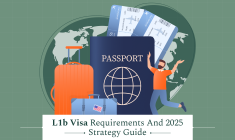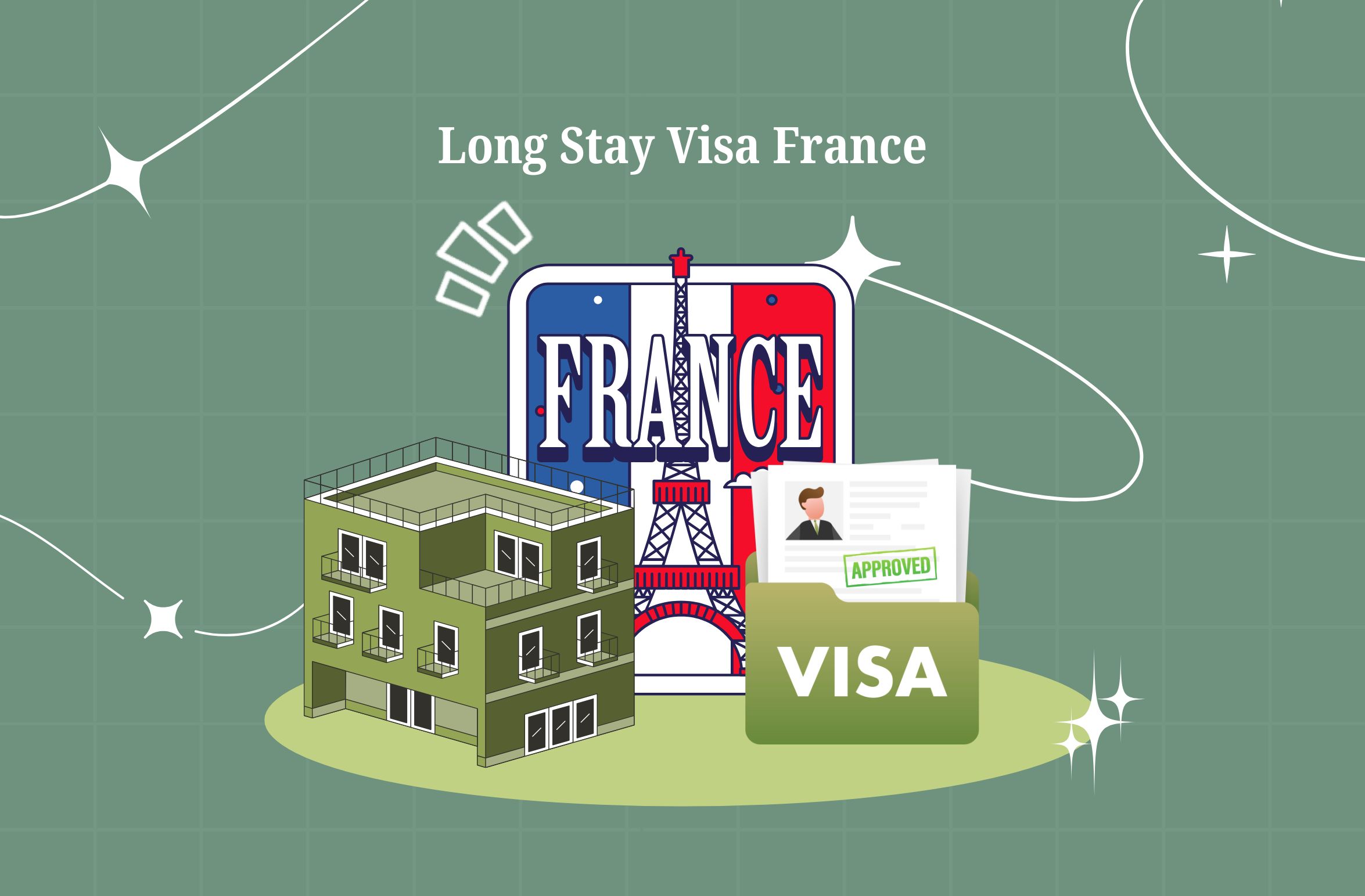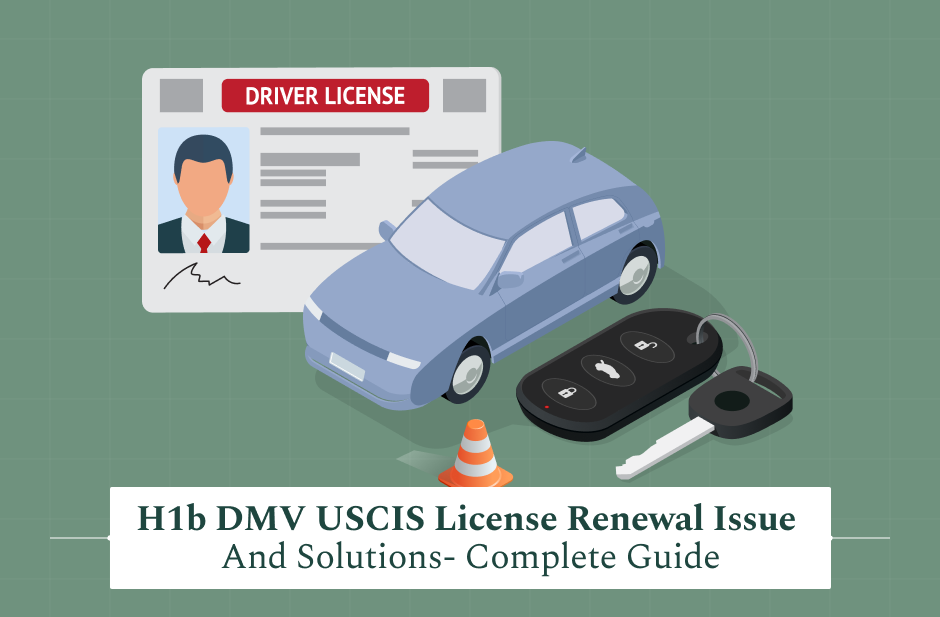France has long captivated dreamers, travelers, and learners alike. Irrespective of whether you want to live in Paris for a year, study in Lyon, or work remotely from Bordeaux, the France long-stay visa (also known as visa de long séjour) opens the door.
Therefore, if you plan to stay longer than 90 days, this visa is mandatory. And this holds true even for citizens of visa-exempt countries. Which is why you should have a clear and detailed understanding of the France long-stay visitor visa application process.
In this article, we will explain the following things:
- What is the long stay visa France?
- What is the process of filing a France long-stay visa application?
- The fees and costs of the long stay visa France.
- Processing time of such a visa.
Therefore, if these are a few things that you want to know, keep on reading this blog till the end…
Understanding The Long Stay Visa France
A France long-stay visa (VLS-TS) is a temporary residence permit that allows foreign nationals to live in France for 4 months to 1 year.
The official website of the French Visa states that you can apply for it depending on your purpose:
- Visitor visa: If you plan to live in France without working.
- Student visa: If you’re enrolled in a French educational institution.
- Talent passport / work visa: If you’re a professional, researcher, or self-employed.
Who Needs A France Long-Stay Visa?
You’ll need this visa if you’re a:
- Non-EU, non-EEA, and non-Swiss nationals staying in France for more than 90 days.
- Student attending a French university or language school.
- Retiree or remote worker wishing to stay long-term without employment in France.
Furthermore, citizens of the EU, EEA, and Switzerland can live and work freely in France without a visa, according to the official government website of France Service Public.
Types Of France Long-Stay Visas
The visa process and other details about the same depend completely on the type of visa you are applying for. For instance, here are the types that you should know about:
| Type of Visa | Best For | Duration | Work Authorization |
| Visitor Visa (VLS-TS Visiteur) | Retirees, freelancers, remote workers | 4–12 months | Not allowed to work in France |
| Student Visa (VLS-TS Étudiant) | University or language students | Up to 1 year (renewable) | 964 hours/year (part-time) |
| Talent Passport | Highly skilled workers, entrepreneurs | 1–4 years | Allowed |
| Family Visa | Spouse or dependent of a French resident | 1 year | Allowed |
| Internship Visa | Trainees or interns | Duration of internship | Allowed within the agreement |
Step-By-Step France Long-Stay Visa Application Process (2025)
When it comes to getting the application approved, it is important that you have a clear idea of the application process. This will ultimately help you in avoiding the mistakes.
Here’s how the application process works:
1. Determine Your Visa Type
Firstly, visit the France-Visas portal and complete the online visa assistant questionnaire to identify the correct category.
2. Create An Online Account
Secondly, fill out the application form and print it. You’ll need it for your visa appointment.
3. Book An Appointment At VFS Global
Thirdly, visit VFS Global France to schedule an appointment in your home country. You’ll need to provide biometric data (fingerprints + photo).
4. Gather Required Documents
Next, carrying and preparing all the necessary documents that you need for your application is extremely important. However, that is something that can depend on your specific need for acquiring the visa.
Here’s a list of all major visa types:
For Visitor Visa:
- Completed and signed the application form.
- Valid passport (issued within the last 10 years).
- Proof of accommodation in France.
- Proof of sufficient funds (€1,380/month).
- Health insurance covering €30,000.
- “Lettre d’engagement” (a written promise not to engage in employment).
For Student Visa:
- Campus France admission letter.
- Proof of financial means (€615/month).
- Proof of accommodation.
- Health insurance certificate.
- Enrollment receipt and tuition payment proof.
For Remote Workers / Freelancers:
- Proof of self-employment or remote income.
- Recent bank statements showing financial stability.
- Health insurance and accommodation proof.
- Commitment letter confirming no French employment.
5. Attend The Appointment & Submit Biometrics
Once you have submitted the visa application, you will get a notification for the next step. And that’s all about going for the interview and submitting your biometrics. This is primarily the last step before they process your visa.
6. Wait For Processing
Finally, the official France Visa website states that the processing time generally ranges from 2 to 8 weeks. However, the French visa website states this is something that would depend completely on your nationality and the visa type.
Tips To Improve Your Approval Chances
• Ensure all documents are translated into French (if not in English or French).
• Write a clear cover letter explaining your reason and ties to your home country.
• Provide proof of return intent — like property ownership or ongoing business.
• Show consistent income for at least six months.
What Is The France Long-Stay Visa Fees (2025)?
Having a clear understanding of how much this entire process will cost can help you greatly. For example, here’s what you need to know:
| Visa Type | Fee (EUR) | Notes |
| Visitor (VLS-TS) | €99 | Payable in local currency |
| Student Visa | €50 | Reduced for educational purposes |
| Talent Passport | €99–€200 | Depends on permit duration |
| Family Reunion | €99 | May require additional documentation |
Furthermore, according to Wise, some applicants may also pay service fees to VFS Global (about €30–€40).
Read Also: E-2 Visa: Investor Visa USA Guide, Requirements, And More
What Happens After You Arrive In France?
Your VLS-TS visa acts as a residence permit. Within 3 months of arrival, you must:
- Validate your visa online at administration-etrangers-en-france.interieur.gouv.fr.
- Pay a tax stamp fee (€200).
- Receive confirmation of your legal stay.
Additionally, if you wish to stay beyond one year, you’ll apply for a Carte de Séjour (residence permit) at your local prefecture.
Can You Work Remotely On a France Visitor Visa?
This is one of the most asked questions by digital nomads.
Technically, yes, if your income originates from a foreign employer or business and you’re not working for a French entity.
France’s visitor visa allows remote work as long as:
- You don’t engage in French labor or receive payment from a French source.
- You can prove stable foreign income.
For Students
According to Service Public, there are a few things that students can do after their studies. For instance, they may:
- Apply for a “Recherche d’emploi” residence permit (to look for work).
- Or switch to a Talent Passport visa if you secure skilled employment.
For Retirees And Expats
Finally, if you’re planning to enjoy your retirement in Provence or Normandy:
- Choose the VLS-TS Visitor category.
- Show proof of long-term accommodation (rental or owned).
- Demonstrate stable income from pensions or savings.
According to the official France Visa website, this visa is renewable and can eventually lead to permanent residency after 5 years.
Mistakes To Avoid When Filing France Long Stay Visa
• Inadequate health insurance (e.g., only travel cover) – many applicants were rejected.
• Insufficient funds or poorly documented income/savings.
• Not validating the VLS-TS after arrival.
• Submitting false/misleading information (cover-letters), weak accommodation proof, remote working without clarifying status.
• Applying too early or too late.
Processing Time, Validity & Renewal Of Long Stay Visa France
It is important that you know how long the entire process of getting the visa to plan things ahead. Here’s how the typical timing looks like:
| Step | Duration | Notes |
| Application processing | 2–8 weeks | Depends on the country and category |
| Visa validity | 4–12 months | Equivalent to your purpose of stay |
| Renewal | Before expiry | At the prefecture or sub-prefecture |
Read Also: Portugal D7 Visa: How to Get This Passive Income Visa?
Have A Hassle-Free Process For French Long Stay Visa!
Apart from the information that I have provided above, you should also take care of your social security entitlements. According to FabExpat, these often “differ depending on your visa type and length of stay in France.”
Additional things that you should keep in mind are:
- A France long-stay visa is essential for anyone staying over 90 days.
- The VLS-TS doubles as your temporary residence permit.
- Remote workers, retirees, and students all qualify under specific categories.
- You must validate the visa online within 3 months of arrival.
- Renewal or extension is possible via a Carte de Séjour.
In conclusion, irrespective of whether you are a digital nomad, sipping espresso in Nice, a student soaking it all in in Paris, or a retiree living the French life, the France Long-Stay Visa will allow you to make France a home.
















